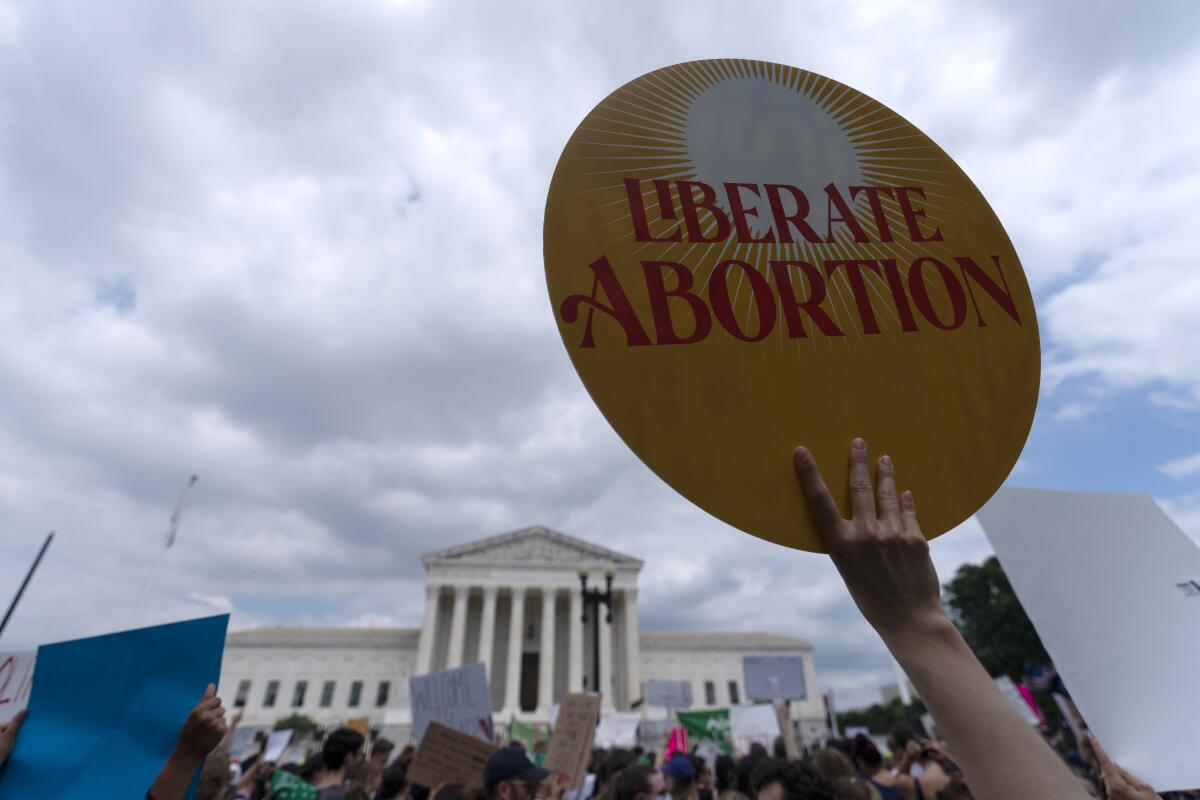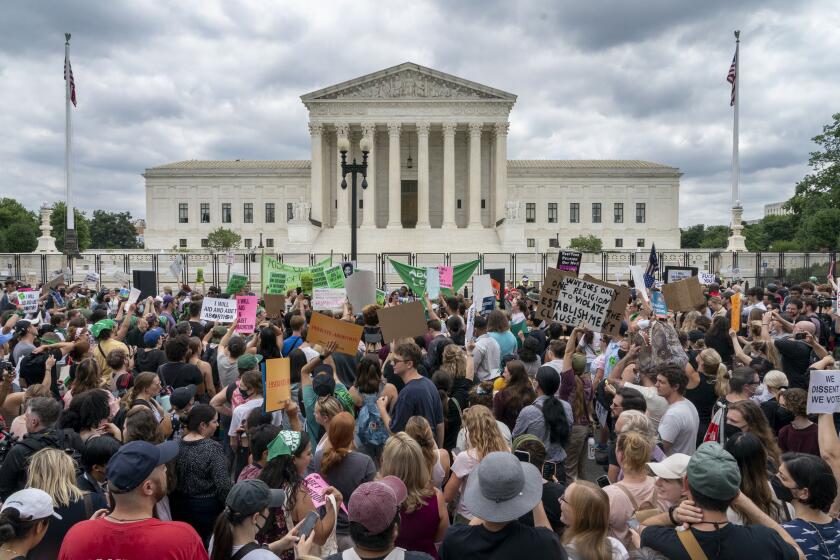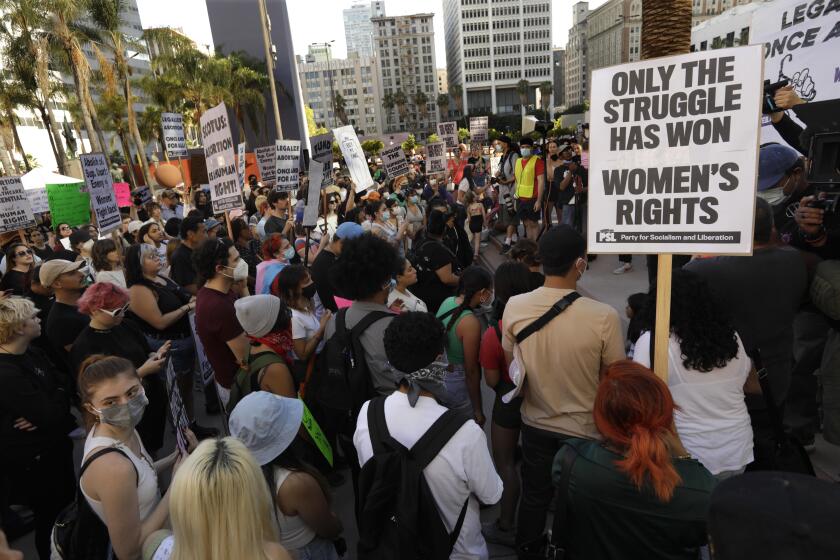Op-Ed: We watched history go in reverse on Friday in Washington

- Share via
My wife canvassed for the Equal Rights Amendment as a teenager. Both of us have marched for abortion rights. We consider Roe vs. Wade to be fundamental, but we also understood that it would be overturned.
Still, it’s one thing to know a catastrophe is coming and another to be on the ground when it arrives. The two of us were visiting Washington on Friday, and when the decision in Dobbs vs. Jackson Women’s Health Organization came down, and Roe was overturned, it felt like a physical assault. We had been planning to go to Capitol Hill, but when we got there, what was most striking was just how quiet, how “normal,” everything was.
On the Mall, tourists posed for photos and bought ice cream. It was a steamy summer day. In one direction, there was the sight of the Washington Monument piercing the sky. In the other, the Capitol Dome. It was as if nothing untoward had happened. It was as if America had remained intact.
But America is, as it has always been, a fantasy. At its best, it aspires to be an expression of our “better angels.” That this is fraught, contradictory, should go without saying. When the Declaration of Independence and the Constitution were composed, nearly a quarter of a millennium ago, they were progressive documents. But what they promise, both practical and idealistic, has always been constrained.
On abortion, guns and religion, the court is giving its Republican sponsors what they hoped for.
Our precious unalienable rights — life, liberty and the pursuit of happiness — were at first reserved for white male landowners. In a very real sense, the history of the country has been the history of the struggle to expand those rights. How do we make good on the promise? Until now, the answer has included the Emancipation Proclamation, the 13th Amendment, women’s suffrage, marriage equality, Brown vs. Board of Education, safe and legal abortion.
A more perfect union must be a work in progress, an expansion of freedom and democracy. That concept is now fully under attack.
Visiting the Capitol, I couldn’t help but recall the Jan. 6, 2021, insurrection, the chaos in the crypt and the rotunda as supporters of the former president smeared feces on the walls and sought to overturn the 2020 election. We are only now discovering just how close they came.
At the Supreme Court, the Dobbs decision, along with the justices’ determination to weaken Miranda rights and allow heedless open gun carry, reveals the sad state of the moral arc of justice in the United States.
My wife and I joined a loose cluster of people moving east on Independence Avenue. We turned north on 1st Street, past the Library of Congress, to the Supreme Court, where tall black perimeter fencing encircled the building and officers in riot gear stood guard before the familiar west façade with its motto: “Equal Justice Under Law.”
A peaceful crowd of several hundred milled about, chanting and holding signs. By the time we arrived, many were defiant, although there were a handful of anti-abortion demonstrators, most of them — how could it be otherwise — men.
The rise and fall of Roe tells a complicated story about where our rights come from, and what we can do to defend them.
“Liberate Abortion,” read a few of the signs, and: “We Will Not Go Back.” Most moving to me was a teenager, his face distraught, who carried a cardboard placard scrawled in marker: “My grandma already marched for this.”
And there it was, the crux of the matter, the stunned feeling that history was moving in reverse. To stand in that place, at that moment, felt less like an act of protest than an act of witness: of the court’s perfidy, yes, but even more of its willingness to dishonor everyone who had ever marched and litigated, struggled and died to acquire abortion rights.
We have never taken away a right once granted in this country. The Dobbs decision represents a disastrous precedent.
And yet, as Sherrilyn Ifill, former president and director-counsel of the NAACP Legal Defense Fund tweeted on Friday, we must “remember that we have never seen the America we’ve been fighting for. So no need to be nostalgic. Right on the other side of this unraveling is opportunity.”
Ifill is correct, I hope. History is not fixed but fluid, which means every moment offers its own set of crossroads, its own possibilities to make things wrong or right. We are at such a crossroads once more in this country, a crossroads that intersects the barricaded steps of the Supreme Court.
As we chanted, my wife and I knew the justices weren’t in earshot. They had been safely removed from the scene. All the same, it felt necessary to be there — with the Capitol behind us and the white marble court building in front of us — dispirited but in solidarity with the America in which we still hope we may one day live.
David L. Ulin is a contributing writer to Opinion.
More to Read
A cure for the common opinion
Get thought-provoking perspectives with our weekly newsletter.
You may occasionally receive promotional content from the Los Angeles Times.












